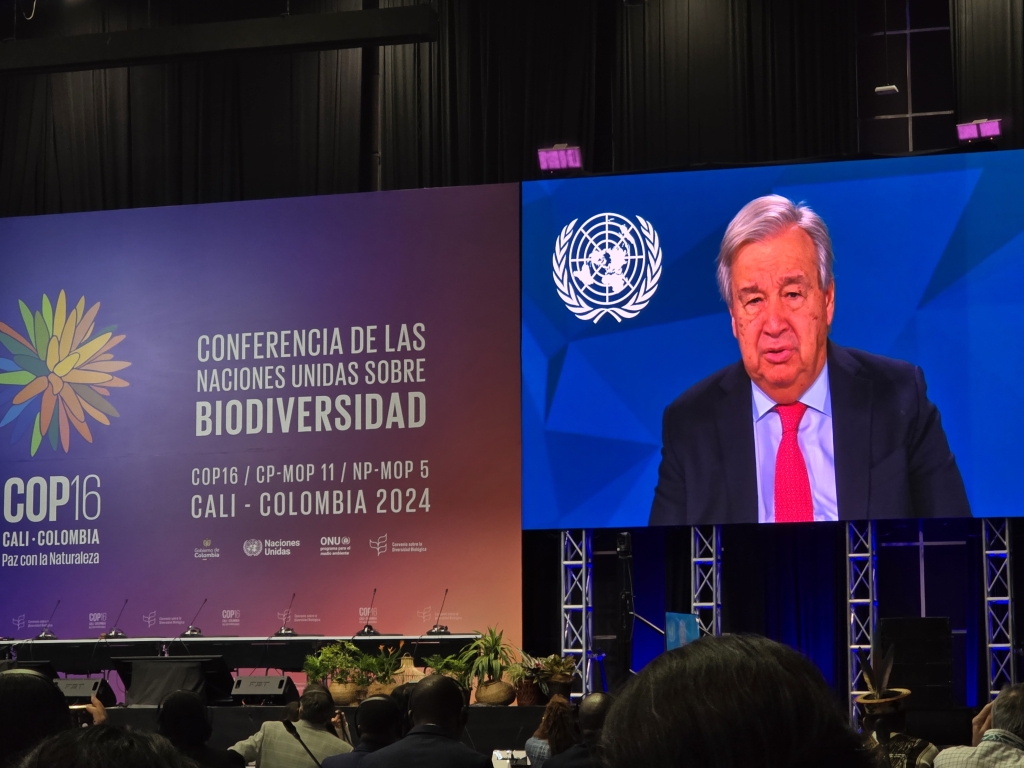
21 October 2024, Calí, Colombia – Fourteen Pacific island countries are in Colombia to push for the implementation of the agreed global Framework on biodiversity to address the challenges the Pacific region faces in nature conservation and management.
The Sixteenth Meeting of the Conference of the Parties (COP16) to the Convention on Biological Diversity (CBD COP16) officially opened on 21 November 2024 in Calíi, witnessed by parties to the Convention, government officials, private sector, civil society, academics and youth under the theme ‘Peace with nature’.
The venue could not be more fitting: Known as one of the most megadiverse countries, Colombia hosts close to 10 per cent of the world’s biodiversity. It ranks first in bird and orchid species diversity and second in plants, butterflies, freshwater fish and amphibians. The nation has several areas of high biological diversity in the Andean ecosystems, characterised by a significant variety of endemic species, followed by the Amazon rainforests and the humid ecosystems in the Chocó biogeographical area.
Incoming President of COP16 and Colombia Minister of Environment, Honourable Susana Muhamad welcomed conference delegates at the Valle del Pacifico Events Center, located in the municipality of Yumbo in Cali's metropolitan area, and she laid a call to action for the world to make peace with nature. “Peace cannot be consolidated in any territory without the inclusion of diversity, without making peace with nature.
“Biodiversity is deeply linked to climate action, and the extractive use of natural resources is responsible for 50 per cent of greenhouse gas emissions today, but at the same time it is causing 90 per cent of biodiversity loss”, she said.
COP16 will be the first biodiversity COP since the adoption of ‘The Biodiversity Plan’ or the Kunming-Montreal Global Biodiversity Framework (GBF). The conference hopes to lay down key milestones in the implementation of the GBF’s goals and 23 targets for 2030.
United Nations Secretary General, Mr António Guterres speaking through a video message, put into perspective the important task ahead for the parties to the Convention. “The Global Biodiversity Framework promises to work with us and our ecosystems, but we are not on track. Your task at this COP is to convert words into action. That means countries presenting clear plans that provide national actions beyond framework status.”
He further urgent significant investment in the GBF, as well as mobilising other sources public and private funds to deliver the framework.

Islands face unique challenges for biodiversity management, due in part to their geographic location. As the intergovernmental organisation mandated with the protection of the Pacific environment, the Secretariat of the Pacific Regional Environment Programme is facilitating the One Pacific Voice at COP16.
SPREP Director General, Mr Sefanaia Nawadra outlined the importance of a unified Pacific voice at COP16. “Successful implementation of the GBF and other work under the Convention will require effectively harmonised, coherent action, mainstreamed across sectors and other existing agreements. In the Pacific we coordinate through SPREP’s Roundtable for Nature Conservation, part of the regional architecture for implementation of our 2050 Blue Pacific Strategy.”
“The importance of island biodiversity and ecosystems should be recognised at COP16 and under the Convention. Adequate resourcing is essential to meet the costs of planning, monitoring, reporting, and review of island biodiversity and we remain committed to supporting the Pacific with their asks at the negotiating tables of COP16.”, Mr Nawadra said.
CBD COP16 will run from 21 October – 1 November and is expected to receive more than 20,000 delegates from across the globe.
The Sixteenth Conference of the Parties to the UN Convention on Biological Diversity (CBD COP16) is held in Calí, Columbia from 21 October – 1 November 2024. COP 16 is the first Biodiversity COP since the adoption of the Kunming-Montreal Global Biodiversity Framework at COP 15 in December 2022 in Montreal, Canada. Governments will be tasked with agreeing on the ways to assess progress towards the Kunming-Montreal Global Biodiversity Framework and advancing the means available to turn the Framework into action. Parties to the Convention are expected to show the alignment of their National Biodiversity Strategies and Action Plans (NBSAPs) with the Framework.
Fourteen Pacific Islands countries are Party to the CBD:Cook Islands, Federated States of Micronesia, Fiji, Kiribati, Nauru, Niue, Palau, Papua New Guinea, Republic of the Marshall Islands, Samoa, Solomon Islands, Tonga, Tuvalu and Vanuatu. Together, they are contributing to a unified One Pacific Voice on collective issues at COP16.
Led by the Secretariat of the Pacific Regional Environment Programme (SPREP), support to Pacific island countries has been implemented with technical input through the Pacific Community (SPC) and the Office of the Pacific Ocean Commissioner (OPOC), and includes a One Pacific approach with financial assistance from the Government of New Zealand and the ACP MEA Phase 3 Project funded by the European Union and the Organisation of African, Caribbean and Pacific States for the ACP countries.
For more information on the CBD COP16, please visit: https://www.cbd.int/conferences/2024